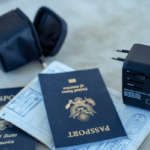Embarking on a journey doesn’t mean leaving behind your healthy eating habits. This guide is crafted specifically for backpackers who aim to explore the world without compromising on nutrition. Discover essential tips and tricks for maintaining a balanced diet, ensuring your adventures are fueled by the best choices for your body and spirit. Enjoy the Healthy Eating Backpackers Guide!
Introduction
Setting off on a backpacking adventure brings excitement and challenges alike. Among these, maintaining a nutritious diet might seem daunting. Yet, it’s crucial for energy and health. With some planning, you can eat well anywhere. This journey begins with understanding the basics of nutrition. Simple, wholesome ingredients become your best allies.
Incorporating “Healthy Eating” into your travel plan is easier than it sounds. Start by selecting natural, unprocessed foods. These provide sustained energy for long walks and hikes. Think whole grains, fruits, vegetables, and lean proteins. They’re not only nutritious but also versatile. With these, you can create meals that are both satisfying and beneficial for your body, ensuring your adventures are fueled correctly.
Lastly, adapting to local food sources can enrich your diet and travel experience. Markets and local produce offer fresh options. They allow you to explore regional flavors while sticking to your healthy eating goals. Always look for balance in your meals. This approach ensures you get the nutrients needed to support your physical activities and adventures ahead.
Planning Your Backpacker Diet

Planning your diet is a cornerstone of healthy eating while backpacking. It starts with understanding your nutritional needs. These vary depending on the intensity of your activities and personal health goals. Map out your meals and snacks. Doing so ensures you have a steady supply of energy throughout your travels. Consider portable, non-perishable items that pack a nutritional punch.
Next, focus on meal diversity to cover all nutrient bases. Incorporate a variety of colors in your fruits and vegetables. This isn’t just visually appealing; it also ensures you’re getting a wide range of vitamins and minerals. Whole grains and lean proteins should also be staples in your backpacker diet. They provide the necessary fuel for your body’s demands during the trek. This approach helps maintain energy levels and supports overall health.
Lastly, preparing some meals in advance can save time and stress. Pre-made quinoa salads or overnight oats are perfect examples. They’re easy to carry and don’t require cooking. For longer trips, research local eateries that offer healthy options. This way, you can enjoy local cuisine without straying from your nutrition goals. Remember, healthy eating backpackers plan their meals but also remain flexible to adapt to new environments.
Top Nutrition Tips for On-the-Go Eating
When you’re constantly on the move, eating healthy can feel like a puzzle. The solution lies in choosing nutrient-dense foods that are easy to carry. These options pack a punch in terms of vitamins and minerals. Fruits like apples and bananas are perfect examples. They offer quick energy and essential nutrients, fitting seamlessly into your backpacking diet.
Moreover, integrating nuts and seeds into your snacks is a smart move. These small but mighty foods offer a hefty dose of protein and healthy fats. They’re ideal for sustained energy during long treks or sightseeing tours. Pairing them with dried fruits can create a balanced snack. This combination keeps hunger at bay while providing a variety of flavors and textures to enjoy.
Lastly, hydration plays a pivotal role in staying healthy on the go. Water should always be your beverage of choice. It’s vital for overall health and helps in nutrient absorption. Carrying a reusable water bottle encourages you to drink regularly. Plus, it’s an eco-friendly choice. Remember, staying hydrated is just as important as what you eat when you’re exploring the great outdoors.
Budget-Friendly Healthy Meals for Travelers

Eating healthy on a budget is a common concern for backpackers. Fortunately, with a bit of creativity, you can prepare meals that are both nutritious and economical. Start by focusing on staples like rice, beans, and pasta. These ingredients are not only affordable but also offer a solid nutritional foundation. They can serve as the base for a variety of meals, ensuring you get essential energy without overspending.
Next, explore local markets for fresh produce. Seasonal fruits and vegetables often come with lower price tags. They also add flavor and nutrients to your meals. Incorporating these into your diet not only supports local economies but also increases your intake of vitamins and minerals. Meals become more colorful and appetizing, encouraging you to enjoy healthy eating regardless of your travel budget.
Moreover, planning meals ahead can save you both time and money. Preparing simple dishes in bulk allows for convenient and quick meals on the go. This approach ensures you have access to healthy options, preventing the temptation to indulge in less nutritious, costly convenience foods. With a little foresight, maintaining a “Healthy Eating Backpackers” lifestyle becomes manageable, proving that a tight budget doesn’t mean sacrificing health or taste.
Essential Nutrients for the Backpacking Journey
Embarking on a backpacking journey requires more than just a map and a good pair of shoes. Your body needs a variety of essential nutrients to keep up with the physical demands of trekking. Carbohydrates are your primary energy source, fueling your muscles and brain during long days. Whole grains, fruits, and vegetables should be staples in your backpack, providing the complex carbs you need.
Proteins play a critical role in muscle repair and growth, especially after a day of hiking. Incorporating lean meats, beans, and dairy products into your meals ensures you’re getting adequate protein. These foods also contribute to a feeling of fullness, helping you avoid unnecessary snacking. Nuts and seeds are excellent portable protein sources that fit easily into your backpack, making them ideal for on-the-go nutrition.
Lastly, fats are essential for long-term energy, so they shouldn’t be overlooked. Healthy fats found in avocados, olive oil, and fatty fish support your energy levels and brain function. Including these in your diet helps you sustain energy throughout your adventures. Remember, balancing these nutrients is key to a successful and healthy backpacking experience, ensuring you’re well-equipped for the physical challenges ahead.
The Best Travel Snacks for Energy and Nutrition
Selecting the right snacks can significantly impact your energy levels and overall health while backpacking. Ideal travel snacks are those that combine nutrition with convenience. For instance, whole grain crackers offer a good mix of carbohydrates and fiber, providing a quick energy boost that lasts. Pairing these with nut butter adds protein and healthy fats, making for a satisfying snack that’s both nutritious and portable.
Dried fruits and nuts are another excellent choice for backpackers. They’re lightweight, non-perishable, and packed with essential nutrients. Dried apricots, for example, are rich in iron and potassium, supporting muscle function and hydration. Almonds, on the other hand, provide protein and healthy fats. Together, they deliver a balanced snack that fuels your body without weighing down your pack, making them a staple for any healthy eating backpackers’ diet.
Lastly, energy bars can be a convenient option, but it’s crucial to choose wisely. Look for bars with minimal added sugars and a high content of natural ingredients. These can offer a quick and effective energy boost, along with important vitamins and minerals. Selecting the right energy bars ensures you receive the benefits without the drawbacks, keeping your nutrition on track even when you’re on the move.
Staying Hydrated: Tips and Tricks
Hydration is a cornerstone of health, especially for backpackers who spend hours on the move. Water regulates your body temperature, keeps joints lubricated, and helps transport nutrients to give you energy. Thus, carrying a reusable water bottle is a non-negotiable item. It ensures you can refill whenever possible, keeping hydration levels optimal without contributing to plastic waste.
Moreover, understanding your body’s hydration needs is crucial. Factors like climate, your activity level, and your body size influence how much water you should drink. As a general rule, aim to drink water regularly throughout the day, not just when you’re thirsty. Adding a pinch of electrolyte powder to your water can also help replenish salts lost through sweat, maintaining your body’s balance and preventing dehydration.
Lastly, listen to your body’s signals. Symptoms of dehydration include fatigue, headache, and dizziness, which can all hinder your backpacking experience. By prioritizing regular water intake, you can prevent these symptoms and ensure your adventures are both enjoyable and healthy. Remember, staying hydrated is just as important as maintaining a nutritious diet on your travels.
Eating Healthy in Local Destinations

Exploring local cuisine is a highlight of any backpacking trip, offering a taste of the culture and region. To maintain a healthy diet, opt for dishes that incorporate fresh, local ingredients. Many destinations are known for their vegetable-rich cuisines, which can be both delicious and nutritious. Seeking out these options allows you to indulge in the local flavor without straying from your health goals.
Another strategy is to choose grilled or baked dishes over fried ones. This simple choice can significantly reduce the intake of unhealthy fats. Additionally, asking for sauces and dressings on the side gives you control over the amount you consume. By making these small adjustments, you can enjoy the diverse culinary offerings of your destination while keeping your diet balanced and healthy.
Moreover, staying flexible with your eating habits can enhance your travel experience. While it’s important to stick to your “Healthy Eating Backpackers” principles, occasionally treating yourself to the local delicacies in moderation can be a rewarding aspect of your journey. This balance ensures you don’t miss out on authentic experiences, all while maintaining a focus on nutrition and wellbeing.
Quick and Easy Recipes for Backpackers
One of the joys of backpacking is the simplicity it brings to daily routines, including meal preparation. Quick and easy recipes are the backbone of a backpacker’s diet. For instance, overnight oats can be a game-changer. Combine rolled oats with water or a milk alternative, add some dried fruits and nuts, and let it sit overnight. You’ll wake up to a nutritious, energy-packed breakfast requiring no cooking.
For lunch or dinner, a simple tuna salad can be both satisfying and nutritious. Mix canned tuna (look for options in water for a healthier choice) with chopped vegetables like carrots, cucumbers, and bell peppers. A dash of olive oil and lemon juice can serve as a light, healthy dressing. This meal is not only quick to prepare but also offers a balanced mix of proteins, healthy fats, and vitamins.
Lastly, for a snack or a light meal, try peanut butter banana wraps. Spread a generous amount of peanut butter on a whole grain tortilla, place a banana on top, and then roll it up. This combination provides a good balance of protein, healthy fats, and carbohydrates. It’s also incredibly portable, making it perfect for those days when you’re exploring and need a quick energy boost.
Conclusion: Embracing Healthy Eating as a Lifestyle Choice
As our journey through the healthy eating guide for backpackers comes to an end, it’s clear that nutrition plays a pivotal role in enhancing your travel experience. Embracing healthy eating as a lifestyle choice, not just a travel hack, can transform your adventures. It fuels your body, mind, and spirit, enabling you to explore the wonders of the world with vitality and enthusiasm.
Incorporating the principles of “Healthy Eating Backpackers” into your daily routine ensures that you’re well-nourished and prepared for whatever adventures lie ahead. It’s about making conscious food choices that support your health and well-being, regardless of where you are. This approach doesn’t just benefit you while traveling; it enriches your life, promoting wellness and energy that transcends the backpacking trail.
Finally, remember that every step towards healthy eating is a step towards a more fulfilling travel experience. The choices you make today shape your journeys tomorrow. So, whether you’re scaling mountains or exploring urban landscapes, let nutritious, balanced meals be your constant companion. Here’s to your health and the countless adventures that await!

Ryan Taylor, a seasoned traveler with over a decade of experience exploring Europe’s nooks and crannies, offers a wealth of knowledge and unique insights into the continent’s diverse cultures and landscapes. His passion for travel began in his early twenties, and since then, Ryan has journeyed through numerous European countries, collecting stories, tips, and a deep understanding of each destination’s unique charm. His blog entries are not just guides but narratives enriched with personal experiences, making every recommendation and piece of advice relatable and practical for fellow travel enthusiasts. With a keen eye for hidden gems and a love for sharing his adventures, Ryan’s writings are a treasure trove for anyone seeking to discover the beauty and richness of Europe.







